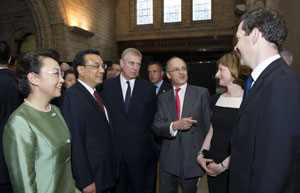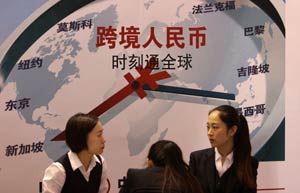Global lenders cash in on rising businesses from domestic and foreign companies, report Jiang Xueqing in Beijing and Emma Dai in Hong Kong.
Many overseas banks reported double-digit profit growth in China in the first half of 2014 thanks to a rapid increase in corporate banking and cross-border renminbi business.
London-based Standard Chartered Plc saw its China income go up 15 percent year-on-year to $515 million and its before-tax operating profit rise 65 percent to $193 million.
HSBC Holdings Plc, also headquartered in London, announced a 64 percent year-on-year increase in profit before tax for its Chinese mainland operations.
Bank of East Asia Ltd saw its profit before tax for mainland operations grow by 25 percent to HK$1.54 billion ($199 million) as of June 30, the bank said.
And DBS Group Holdings Ltd, the former Development Bank of Singapore and Southeast Asia's largest lender, reported its net profit for the Chinese mainland and Taiwan rose to $160 million in the first half, up from $58 million in the same period of 2013. Its income in the same region posted growth of 42 percent to $503 million, as both net interest and non-interest income rose.
Kenny Wen, chief strategist for Sun Hung Kai Financial, a Hong Kong-based wealth manager, said the profit gains that overseas banks achieved on the Chinese mainland can be attributed to growth in corporate banking business as well as lower operating costs.
Cross-border renminbi business also picked up steam on the mainland after the daily trading range of the currency was widened in March to 2 percent from its previous band of 1 percent.
"Many overseas banks, because of their multinational business, witnessed strong growth in yuan loans and options," Wen said.
With progress also being made in the China (Shanghai) Pilot Free Trade Zone, along with efforts toward opening up China's capital account, Wen expects renminbi business will continue to pick up as growth in the offshore renminbi pool accelerates.
Standard Chartered saw strong corporate client activities, cross-border trades and a steady increase in renminbi business during the first six months of 2014 despite China's economic slowdown, said Jerry Zhang, CEO and executive vice-chairman of Standard Chartered Bank China.
"In particular, we had a strong performance in transaction banking, benefiting from trade volume growth, and in assets and liabilities management, benefiting from our global leadership position in the internationalization of the yuan," Zhang said.
Standard Chartered became one of the first market-makers for direct trading between the yuan and the British pound. It was also among the first batch of banks to launch cross-border renminbi loans in the Suzhou Industrial Park in Jiangsu province.
The bank teamed up with clients to conduct the first non-quota-based yuan-denominated two-way cross-border sweeping transaction in the Shanghai FTZ.
Zhang said the bank will continue to invest in China and expand its service network.
Along with providing support to small and medium-sized enterprises and high-net-worth individuals, it will help foreign companies enter and expand in China, and assist Chinese enterprises in exploring overseas markets, he said.
Bank of East Asia recorded a huge increase in fee income generated from corporate customers. Competition for deposits intensified in the first half of this year, driving up funding costs. This exerted pressure on BEA China's net interest margin, which fell by 24 basis points from the second half of 2013, the bank said in announcing its 2014 interim results.
 |
 |
| Yuan-denominated green bond debuts in London |
|
